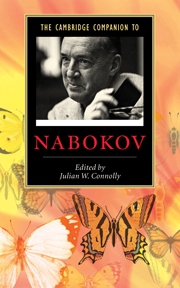Book contents
- Frontmatter
- Introduction
- Part I Contexts
- Part II Works
- 6 Nabokov as poet
- 7 Nabokov’s short fiction
- 8 The major Russian novels
- 9 From Sirin to Nabokov
- 10 Nabokov’s biographical impulse
- 11 The Lolita phenomenon from Paris to Tehran
- 12 Nabokov’s late fiction
- Part III Related worlds
- Guide to further reading
- Index
- Series List
6 - Nabokov as poet
from Part II - Works
Published online by Cambridge University Press: 28 May 2006
- Frontmatter
- Introduction
- Part I Contexts
- Part II Works
- 6 Nabokov as poet
- 7 Nabokov’s short fiction
- 8 The major Russian novels
- 9 From Sirin to Nabokov
- 10 Nabokov’s biographical impulse
- 11 The Lolita phenomenon from Paris to Tehran
- 12 Nabokov’s late fiction
- Part III Related worlds
- Guide to further reading
- Index
- Series List
Summary
Nabokov's reputation rests to such a degree on his achievements as a prose writer that it is easy to overlook his entry into literature as a poet. In this regard he is reminiscent of two illustrious predecessors, Ivan Turgenev and Ivan Bunin, both of whom similarly began by writing poetry. Turgenev, though, quickly realized that his true talent was in prose and soon abandoned verse. Bunin, in contrast, was more similar to Nabokov in that he did not forsake poetry after turning to prose but continued to compose verse, albeit with decreasing frequency, throughout his career. However, as the recipient of the Pushkin Prize in 1903, Bunin had achieved some renown for his verse, while Nabokov, who expressed admiration for Bunin's poetry and was apparently influenced by it, would likely have remained a footnote in literary history had he not begun to write prose.
Nabokov’s interest in poetry nonetheless figures prominently in his reputation as a major literary figure. In his translation of Pushkin’s great novel in verse, Eugene Onegin, Nabokov purposely did not use rhyme or adhere to the iambic tetrameter of the original, asserting that to do so would mean sacrificing literal accuracy. He then attacked a rhymed and metrical translation by Walter Arndt that appeared at about the same time. The resulting intense debate over the relative merits of the two approaches continues to resonate. Pale Fire, among his best and most complex novels in English, begins with a 999-line poem in heroic couplets (iambic hexameter verse with each pair of lines rhyming). Bits of Russian poetry sometimes occur in his English novels; thus he inserts “Vliublennost” (“Being in Love”), which in some ways resembles his own early love poetry, in the quasi-autobiographical Look at the Harlequins! (25 [pt. 1, ch. 5]), and parodies Anna Akhmatova and her imitators in Pnin (56 [ch. 2], 181 [ch. 7]). His last Russian novel, The Gift, includes more than two dozen poems or poetic fragments, most ostensibly written by the quasi-autobiographical protagonist.
- Type
- Chapter
- Information
- The Cambridge Companion to Nabokov , pp. 103 - 118Publisher: Cambridge University PressPrint publication year: 2005



